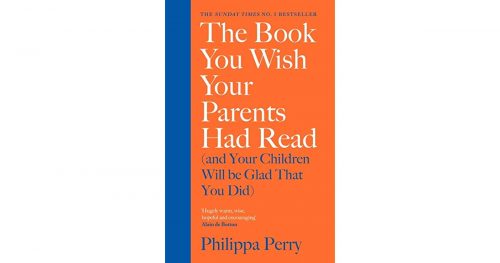
Parenting. It’s a daily battle – but does it have to be?
In ‘The Book You Wish Your Parents Had Read (and Your Children Will be Glad That You Did)’, psychotherapist Phillipa Perry explores parent-child relationships with a view to encouraging parents to relate more effectively to their children.
What’s it about?
I’m going to quote from the foreword here as it is an effective summary:
‘This book is about how we have relationships with our children, what gets in the way of a good connection and what can enhance it.
‘It’s about how we were brought up and how that has a bearing on how we parent, about the mistakes we’ll make – especially those we never wanted to make – and what to do about them.’
Perry then warns readers that:
‘You will not find many tips, tricks or parenting hacks in this book, and at times it may upset you, make you angry or even make you a better parent.’
This, I think, is at the heart of the book. There are no tips, tricks or hacks that will allow you to shortcut your relationship with your child. If you want a child to listen to you, you must listen to them and respectfully acknowledge and respond to their feelings, not simply deal with them as a subordiate entity which must be fed, watered and dressed appropriately for the weather before being delivered to their place of care / education / work.
This may not sound like breaking news in the parenting world, but it does run counter to mainstream parenting approaches which typically advocate a more authoritarian approach, with an adult ‘do-er’ and a passive child who is ‘done to’. Perry warns that this approach can encourage a child to choose between two limited roles: passive victim and active bully, neither of which is what we want for our children.
What’s it like?
Warm, encouraging and reassuring, this is a very positive parenting book. We all make mistakes. The important thing is to understand what kind of relationship we want with our child and how to get it, then aim to minimise mistakes while also understanding how to repair them.
Perry couldn’t care less if you are divorced, single parenting, a stay-at-home mum or a do-it-all dad; what she cares about is showing you how to improve your relationship with your child by repairing ruptures, allowing their feelings and setting boundaries with honesty. (If you don’t want your teenager staying out later than 11pm because you don’t feel comfortable with that, then give that as your reason rather than claiming they are too young. You teen still won’t like it but they’re more likely to respect it.)
Perry discusses a range of factors than can influence the parent – child relationship, but the consistent message is that it must not be an exercise of authoritarian instruction or covert manipulation (she is positively disdainful when extolling the pitfalls of sticker reward charts); instead, your aim is to develop a loving, honest and trusting relationship within which your child knows that you hear them, value them and will consider their feelings as well as their needs because, actually, valuing their feelings IS one of their needs.
The whole contents of this book reminded me of a quote (attributed by Goodreads to Catherine M. Wallace) I spotted once which really resonated with me:
âListen earnestly to anything [your children] want to tell you, no matter what. If you don’t listen eagerly to the little stuff when they are little, they won’t tell you the big stuff when they are big, because to them all of it has always been big stuff.â
Final thoughts
The strongest message I will be taking away from this book is that a child’s behaviour cannot and should not be divided into ‘good’ and ‘bad’. This has always seemed obvious to me when discussing babies* but it is trickier to remember when a wilful 5 year old or stubborn 7 year old is refusing to do what you’ve asked!
Instead, Perry suggests that children’s behaviour is simply ‘convenient’ or ‘inconvenient’, which makes perfect sense. When my 3 year old takes her own sweet time finishing her game, then insists on putting on her own shoes, painfully slowly, and then tries to initiate a game of hide-the-gloves, she is not being disobedient or naughty or rebellious: she just doesn’t understand that we need to leave the house right now.
I’m really glad I read this book; I feel it will help me to be more aware of how I interact with my children and the impact this can have on them.
‘The Book You Wish Your Children Had Read’,
Philippa Perry,
2019, Penguin Life, hardback
* When my babies were very small, I hated being asked by friends, family and strangers if they were ‘good’, as this usually meant ‘do they sleep through the night’. (My usual response: ‘No, because they are a BABY and sleeping through the night is a totally inappropriate and actually quite dangerous cultural assumption since small babies are not designed to sleep through the night.’)